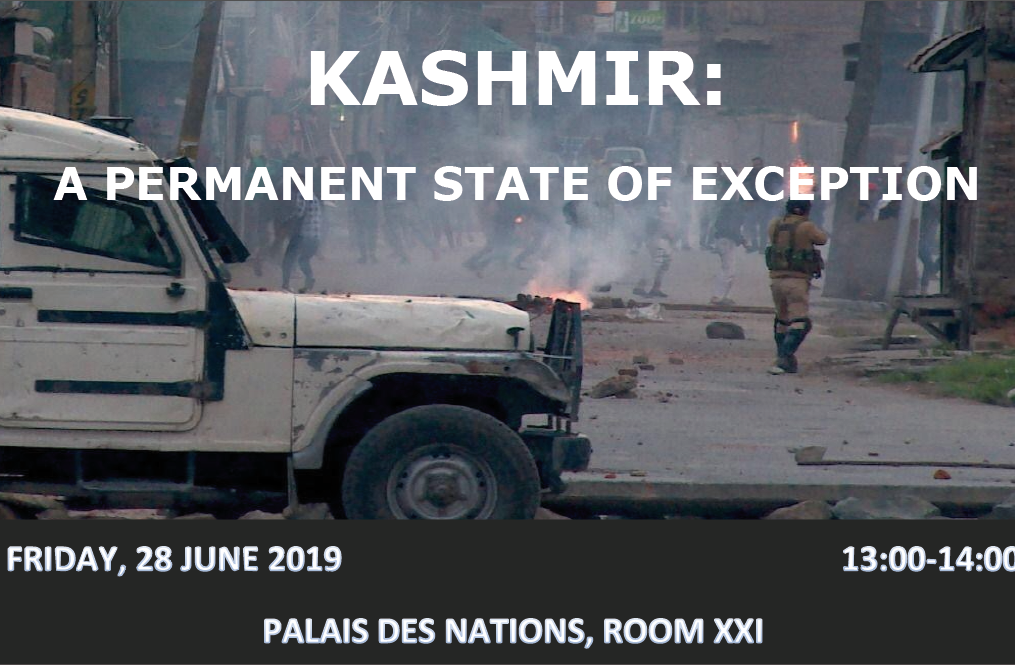
Jun 23, 2019 | Events, News
This side event will take place on Friday 28 June 2019, from 13:00-14:00, in Room XXI, at the Palais des Nations.
There has been an increase in serious human rights violations in Kashmir, particularly since 2016. This has coincided with shrinking space for human rights reporting and advocacy at the national level, with human rights defenders facing unprecedented threats and reprisals.
The escalating violence, coupled with systemic impunity for perpetrators, has made it imperative for the human rights situation in Kashmir to be highlighted at the international level, including at the UN.
This event aims to bring to the forefront the human rights aspect of the conflict and discuss possible strategies through which the international community can play a more effective role in ensuring the promotion and protection of human rights in the region.
Keynote Address
Hon. Judge Navanethem Pillay: Former UN High Commissioner for Human Rights (2008-2014)
Moderator
Sam Zarifi: ICJ Secretary General
Speakers
Juliette Rousselot: Program Officer for South Asia, International Federation for Human Rights (FIDH)
Gerard Staberock: Secretary General, World Organization Against Torture (OMCT)
Dr. Angana Chatterji: Co-chair, Initiative on Political Conflict, Gender and People’s Rights, Center for Race and Gender, University of California, Berkeley
Kashmir-HRC-Event-2019-ENG (Flyer in PDF)
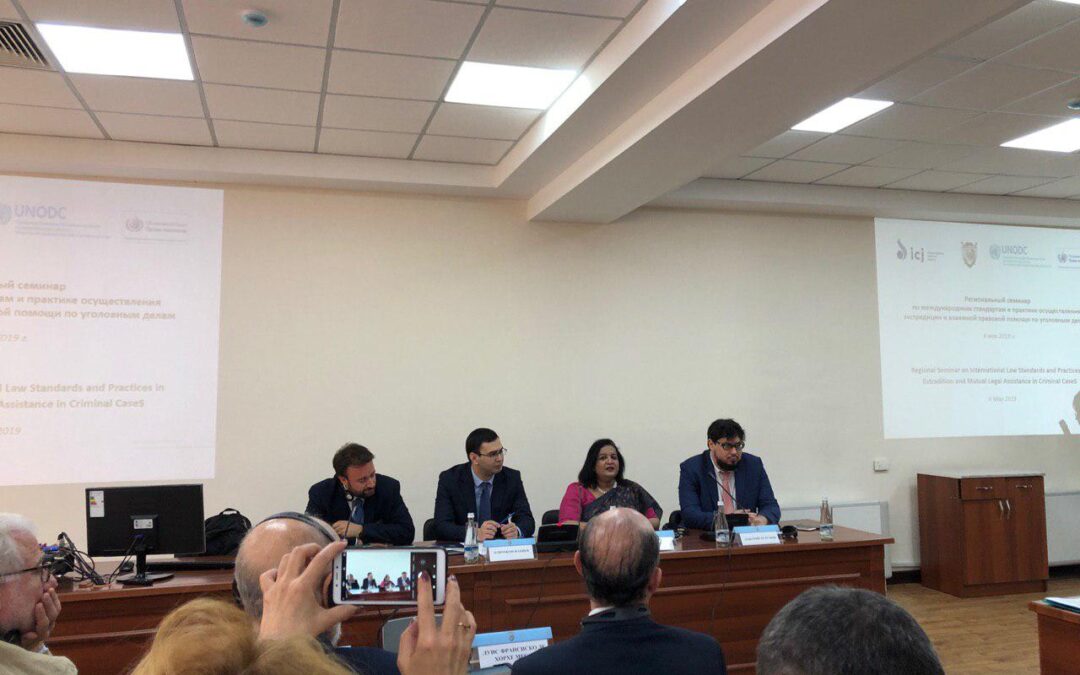
May 6, 2019 | Agendas, Events
Today, the ICJ, together with the General Prosecutor’s Office of Uzbekistan, UNODC and OHCHR are holding the first regional meeting of prosecutors from Central Asia and the Russian Federation to discuss international law and standards in the field of extradition, mutual legal assistance, the rule of law and human rights.
The workshop aims to facilitate exchange of experiences regarding the law and practice of extradition in European and Central Asian countries. Presentations at the workshop will analyse international law and standards on effective criminal justice co-operation and the protection of human rights in extradition, and their application in practice..
The workshop will present cases of mutual cooperation in the field of criminal law from national courts as well as from international mechanisms such as the European Court of Human Rights, the UN Committee against Torture and the UN Human Rights Committee.
The workshop is taking place in Tashkent (Uzbekistan) and is hosted by the Prosecutor General’s Office of Uzbekistan.
More than twenty prosecutors from Kazakhstan, Kyrgyzstan the Russian Federation Tajikistan, Turkmenistan, and Uzbekistan are participating in the event that includes international experts from UNODC, ICJ, including ICJ Commissioner and Emeritus Spanish Supreme Court Justice, José Antonio Martin Pallin, and Italian Prosecutor Lorenzo Salazar.
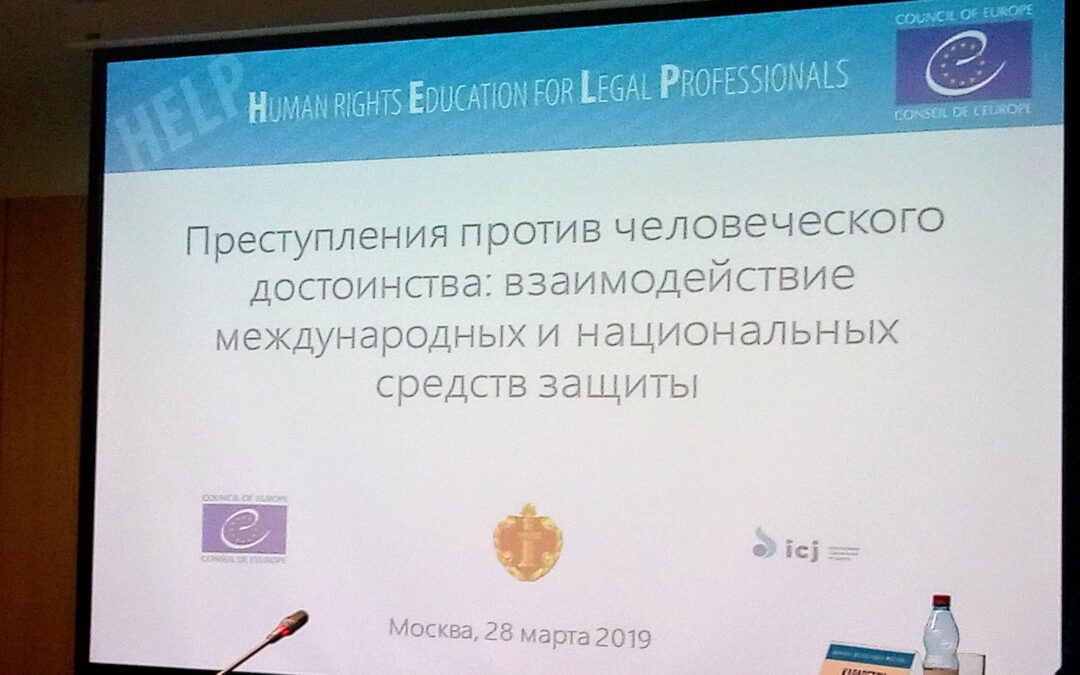
Mar 28, 2019 | Events, News
The ICJ is co-operating in a conference organized by the Council of Europe and the Federal Bar Association of Russia on “Crimes against Human Dignity: Interaction of International and National Remedies”, which will take place today, 28 March 2019 in Moscow.
The Conference will address crimes that affect physical and moral integrity of a person, notably through ill- treatment, domestic violence, trafficking in human beings and other forms of modern slavery. The core provisions of the European Convention on Human Rights and the related case-law of the European Court of Human Rights are of particular relevance in combatting these phenomena. The Conference will address national and international remedies against such crimes and serve for exchange of good legal practices in that regard.
Mikhail Lobov, Head of Human Rights Policy and Co-operation Department of the Council of Europe, Yuriy Pilipenko, President of the Federal Bar Association, Denis Novak, Vice-Minister of Justice of the Russian Federation, Radmila Dragichevich Dichich, Vice-President of the International Commission of Jurists, Judge of the Supreme Court of Serbia, Ilya Subbotin, Deputy Director of the Depratment of Paneuropean Co-operation of the Russian Foreign Ministry and Petr Sich, Head of Council of Europe Programme Office in the Russian Federation will open the Conference.
The Conference will give an overview of identification and qualification of crimes against human dignity, as well as of assessment of evidence and investigation of such violations. Special attention will be paid to such questions as professional training of practicing lawyers as a factor of strengthening of remedies’ efficiency and, in more general terms, the role of advocates in the framework of the Council of Europe conventions.
The event will take place on 28 March 2019 at 09.30 a.m., in Moscow, Hotel “Azimut Smolenskaya”, Smolenskaya street, 8.
The agenda for the conference is available here
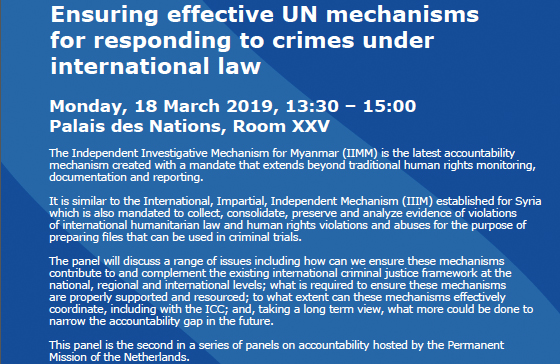
Mar 19, 2019 | Events, Multimedia items, News, Video clips
Watch on video this side event held on 18 March 2019 at the Human Rights Council.
The Independent Investigative Mechanism for Myanmar (IIMM) is the latest accountability mechanism created with a mandate that extends beyond traditional human rights monitoring, documentation and reporting.
It is similar to the International, Impartial, Independent Mechanism (IIIM) established for Syria which is also mandated to collect, consolidate, preserve and analyze evidence of violations of international humanitarian law and human rights violations and abuses for the purpose of preparing files that can be used in criminal trials.
The panel discussed a range of issues including how can we ensure these mechanisms contribute to and complement the existing international criminal justice framework at the national, regional and international levels; what is required to ensure these mechanisms are properly supported and resourced; to what extent can these mechanisms effectively coordinate, including with the ICC; and, taking a long term view, what more could be done to narrow the accountability gap in the future.
This panel was the second in a series of panels on accountability hosted by the Permanent Mission of the Netherlands.
Opening Remarks:
- Ambassador Monique van Daalen, Permanent Representative to the UN of the Kingdom of the Netherlands
Moderator:
- Saman Zia-Zarifi, Secretary General, International Commission of Jurists
Panelists:
- Andrew Clapham, Member of the Commission on Human Rights in South Sudan
- Sanji Monageng, former Judge/Vice-President of the ICC, and Commissioner of the ICJ
- Stephen Rapp, Chair, Commission for International Justice & Accountability (CIJA), Distinguished Fellow, US Holocaust Memorial Museum, and former United States Ambassador-at-Large for Global Criminal Justice
- Amady Ba, Head, International Cooperation Section, JCCD, OTP, International Criminal Court (ICC)
- Kingsley Abbott, ICJ Senior Legal Adviser for Global Redress and Accountability
Side event ICJ NL Accountability No2 (side event flyer, in PDF)
Watch on video:
https://www.facebook.com/ridhglobal/videos/347634279184620/UzpfSTQ3MTQ2NzA4NjIyMTM3MzoyNDc4ODQxODc4ODE3MjA3/
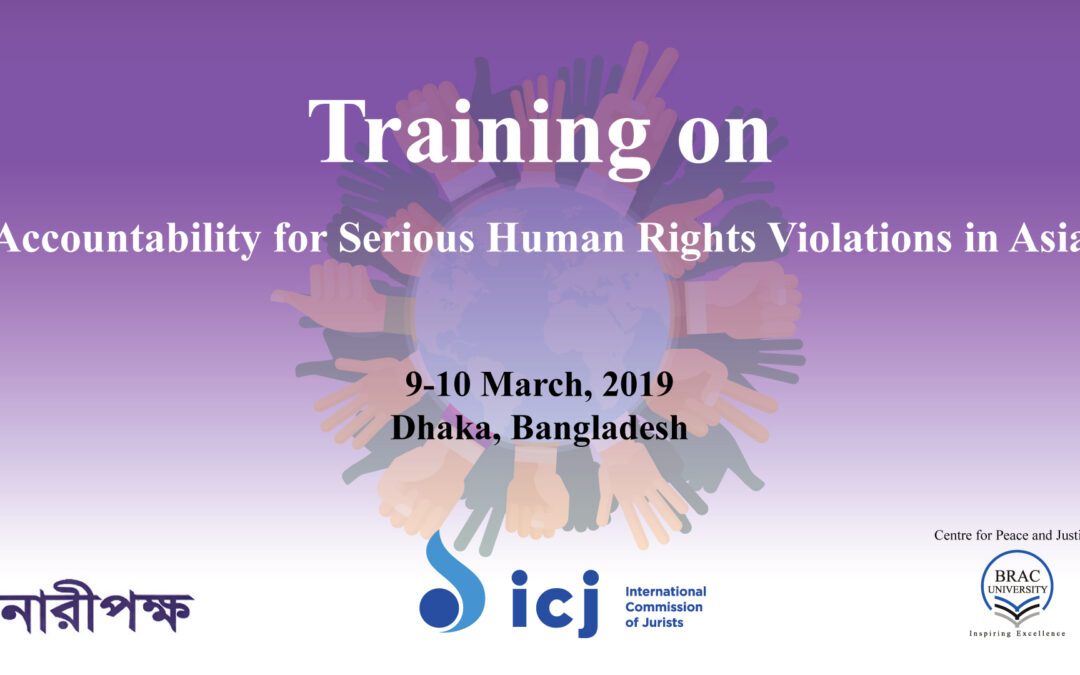
Mar 12, 2019 | Events, News
The ICJ convened a two-day workshop from 9th to 10th March 2019 in Dhaka, Bangladesh to discuss applicable international legal mechanisms designed to achieve accountability for serious human rights violations in Asia.
Bangladesh-based non-government organizations the Centre for Peace and Justice and Naripokkho co-hosted the event with the ICJ, with a representative of AJAR (Asia Justice and Rights) also joining. Twenty Bangladeshi lawyers, activists and academics attended the event.
Legal advisers from the ICJ provided an overview of the Independent Investigative Mechanism for Myanmar (IIMM), currently being established following a UN Human Rights Council resolution in September 2018.
They also discussed the structure and procedures of the International Criminal Court (ICC), whose prosecutors are currently conducting a preliminary examination into the deportation of Rohingyas from Myanmar into Bangladesh. Unlike Myanmar, Bangladesh is a State Party to the Rome Statute of the ICC, and its pre-trial chamber has indicated the Court has jurisdiction over crimes listed in the Rome Stature were one element, or part of a crime, was committed inside the territory of Bangladesh.
AJAR’s co-founder provided an overview of transitional justice processes, drawing upon international and regional experiences of truth-seeking, prosecutions, reparations and reforms to guarantee non-repetition of human rights violations.
Two of the ICJ’s legal advisers also travelled to Cox’s Bazar, Bangladesh, where they met relevant stakeholders to discuss the situation of Rohingya refugees from Myanmar, and to share information about accountability mechanisms, including about expected timelines, outcomes and limitations.
The activity is part of the ICJ’s global work on promoting accountability and redress for gross human rights violations to facilitate justice and deter repetition.
Contact: Kingsley Abbott, ICJ Senior Legal Advisor for Global Redress and Accountability e: kingsley.abbott@icj.org
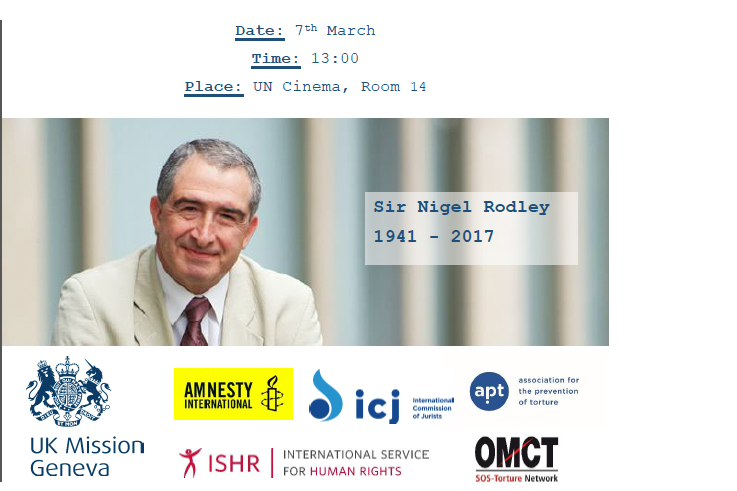
Mar 7, 2019 | Events, News
The ICJ is proud to join in presenting the documentary film The Long Haul, to be screened during the UN Human Rights Council session in Geneva.
Inspired by the life of the late Nigel Rodley—one of the principal architects of the modern human rights framework— the documentary The Long Haul addresses the current backlash on human rights and how best to respond.
Sir Nigel’s remarkable life story is an inspiration to stand up against wrongdoing and to continue fighting for equality and justice. At the same time, his family history is a reminder of the WWII tragedies that gave birth to the modern human rights regime and what could happen if we fail to honour these basic rights.
Nigel Rodley dedicated his career to the protection of those most at risk, including as Amnesty International’s first legal adviser and later as UN Special Rapporteur on Torture as then as a member and eventually Chair of the Human Rights Committee. He had a longstanding association with the ICJ as Commissioner and in other roles, and was President of the ICJ at the time he passed away.
The film will be screened at a side event to the UN Human Rights Council session, at 13h00 on Thursday 7 March, in Room XIV (UN Cinema) of the Palais des Nations in Geneva. Access is available only to those who already hold grounds passes for the UN in Geneva, or accreditation for the Council session.
The event is organised by the Permanent Mission of the United Kingdom in Geneva, with participation of the International Commission of Jurists (ICJ), Amnesty International, the World Organisation against Torture (OMCT), Association for the Prevention of Torture (APT), and International Service for Human Rights (ISHR).
For more information contact un(a)icj.org
A flyer for the event can be downloaded in PDF format here: Events-NigelRodleyFilm-2019-En










